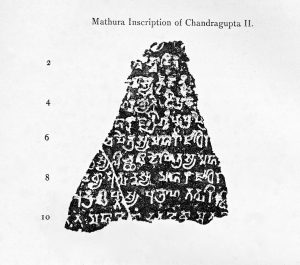
11-12) [By the prosperous Candragupta, the mahārājādhirāja, an ardent devotee of Bhagavat (Vāsudeva),
9-10) who is the son of [the prosperous Samudragupta, the mahārājādhirāja, accepted by him (as his successor) (and) born of Mahādevī Dattadevī;
1-5) [Samudragupta], who was the exterminator of all king—who had no equal adversary on earth, [whose fame was] tasted (by the waters of the four oceans), who was equal to (the gods) [Dhanada, Varuṇa, Indra and Antaka], who was [the very axe] of Kṛtānta (God of death), who was the giver of [many] crores of [lawfully acquired cows] and gold, [who was the performer of the aśvamedha sacrifice, that had long decayed]:
5-8) who was the son of the son’s son of the prosperous Gupta, the mahārāja; the son’s son of [the prosperous] Ghaṭotkaca, [the mahārāja]; (and) the son of [the prosperous Candragupta (I), the mahārājādhirāja, the daughter’s son of Licchavi; (and) born of the Mahādevī Kumāradevī.